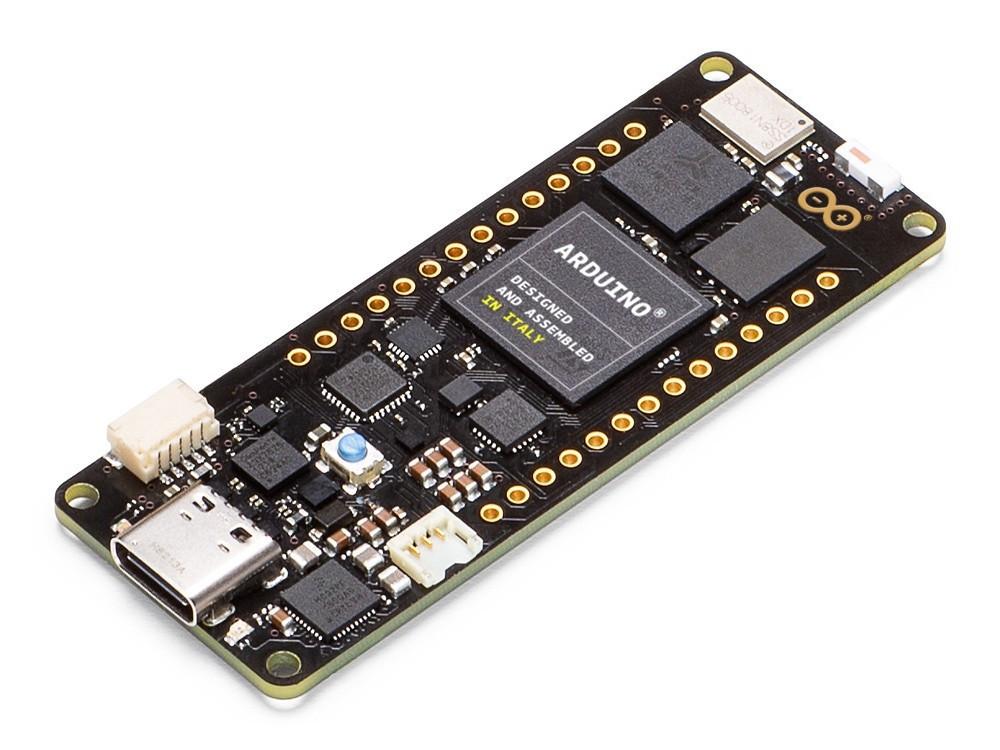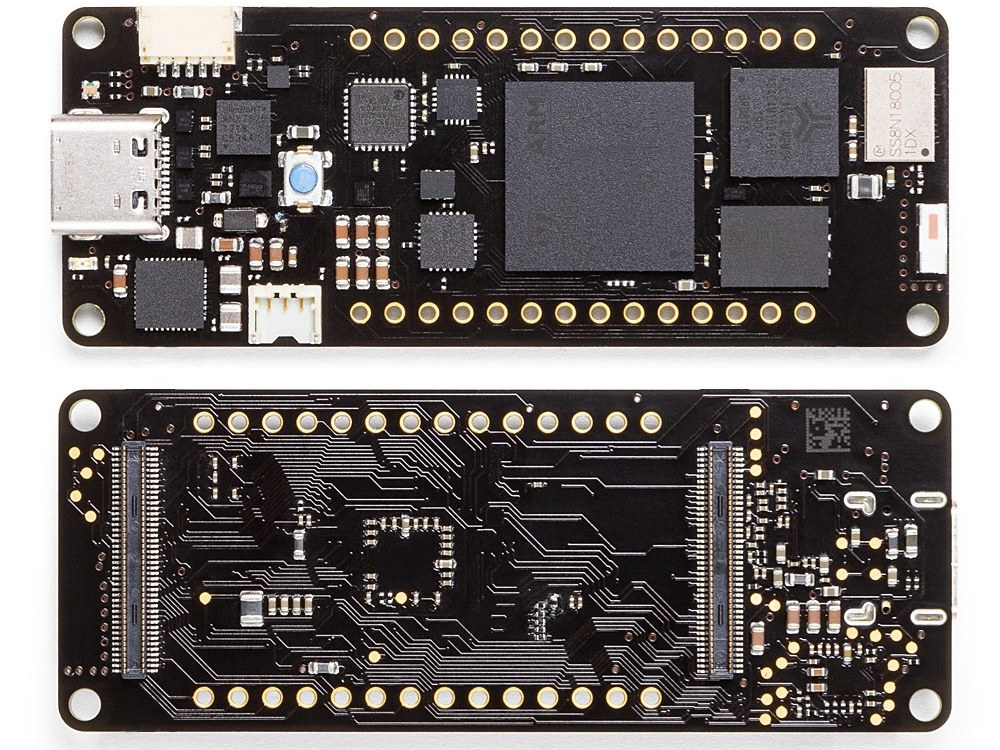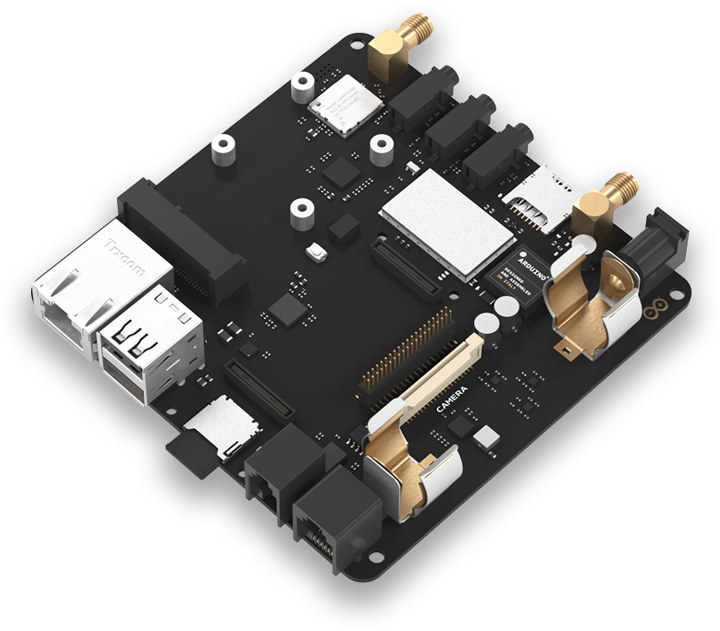Arduino is now at CES 2020 promoting its Arduino Pro all-in-all IoT solution for professionals with the Arduino Pro IDE, Arm Pelion IoT platform for device management, and a new Portenta industry-grade board family starting with Arduino Portenta H7 board powered by STMicro STM32H7 dual-core Arm Cortex-M7/M4 microcontroller.
Arduino Portenta H7

Specifications:
- Microcontroller – STMicro STM32H747XI Cortex-M7 @ 480 MHz + M4 @ 200 MHz MCU with 2MB dual-bank Flash memory, 1 MB RAM, Chrom-ART graphical hardware accelerator
- System Memory – 2MB SDRAM (upgradeable up to 64MB)
- Storage – 16MB QSPI NOR Flash (Upgradeable up to 128MB)
- Connectivity
- 2.4GHz WiFi 802.11b/g/n up to 65 Mbps and Bluetooth 5.1 BR/EDR/LE via Murata 1DX module
- On-board 10/100M PHY
- Video I/F – MIPI DSI & 8-bit camera interfaces via 80-pin expansion connector, DisplayPort over USB-C port
- USB – 1x USB 2.0 Type-C port for power (PD), programming, and DisplayPort output
- I/Os
- Arduino MKR headers with UART1, 6x Analog input pins, GPIO, PWM, SPI, I2C, Reset, 5V, 3.3V, and GND
- 2x 80 pin high-density connectors with (See pinout diagram for details)
- Storage – SD card signals
- Connectivity – 10/100M Ethernet
- Display – MIPI DSI
- Camera – 8-pin camera Interface up to 80 MHz
- Audio – I2S, DMIC, SAI
- USB – 2x USB 2.0 interfaces
- Serial – 4x UART ports (2 with flow control), CAN bus (Tx/Rx)
- 2x I2C, SPI
- 8× ADC pins with 16-bit max. resolution
- 2× 12-bit DAC (@ 1 MHz)
- 6x GPIO and 10x PWM
- Debug – SWD interface
- 5-pin I2C connector with 1.0mm pitch
- 3.3V operating voltage
- Security – NXP SE0502 secure element
- Misc – 22x timers and watchdogs
- Power Supply
- 5V via USB-C port or VIN pin
- Support for 3.7V/700mAH minimum LiPo single-cell battery; integrated charger
- Consumption – 2.95 μA in Standby mode (Backup SRAM OFF, RTC/LSE ON)
- Temperature Range – -40 °C to +85 °C (excl. Wireless module) / -10 °C to +55 °C (incl. Wireless module)

Beside running Arduino sketches on top of the Arm Mbed OS powering the board, one can also run native Mbed applications, MicroPython or JavaScript programs via an interpreter, or AI workloads using TensorFlow Lite. Furthermore, it’s possible to leverage the two cores on STM32H7 microcontroller by running Arduino code on the Cortex-M4 core, while interpreting MicroPython code on the Cortex-M7 core or vice-versa.
Some applications for Portenta H7 board include high-end industrial machinery, laboratory equipment, computer vision, PLCs, industry-ready user interfaces, robotics controller, mission-critical devices, dedicated stationary computer, or “high-speed booting computation”.
Portenta Carrier

It would be a shame to have all those 160-pin exposed via the board-to-board connectors go to waste, so Arduino also designed the Portenta Carrier board with the following features:
- Storage – MicroSD card slot
- Camera – 8-bit LVTTL/2-lane MIPI CSI connector
- Audio -3x audio-jacks for in- or output of analog sound
Connectivity and Networking- Gigabit Ethernet connect (RJ45) – CNXSoft note: A bit confused since there’s a 10/100M on Portenta H7 board, so it’s probably for future Arduino boards supporting Gigabit Ethernet
- Cellular network – NBIoT / CatM1 / GPRS Modem & SIM card connector
- LPWAN – LoRa via Murata CMWX1ZZABZ LoRa module
- 2x antenna connectors
- USB – 2x USB ports
- Serial – RJ-9 connector for CAN bus, RJ-11 for RS232/422/485
- Expansion
- 40-pin GPIO connector
- mPCIe connector (USB,I2C) for external modules
- Power Supply – Via external supply, or on-board battery connector
- Dimensions – SGET eNUC (Embedded NUC) form factor
That’s the first Arduino board that more like a small embedded computer/gateway with so many options.
Pricing and Availability
The Arduino Portenta H7 board is already up for pre-order and shipping should start at the end of February 2020. The board itself is sold for $99.90, but the carrier board does not appear to be available just yet. You’ll find more information about Arduino’s professional offerings on the company’s website.

Jean-Luc started CNX Software in 2010 as a part-time endeavor, before quitting his job as a software engineering manager, and starting to write daily news, and reviews full time later in 2011.
Support CNX Software! Donate via cryptocurrencies, become a Patron on Patreon, or purchase goods on Amazon or Aliexpress. We also use affiliate links in articles to earn commissions if you make a purchase after clicking on those links.





That’s an impressive set of features for an Arduino. An impressive price as well by the way. It may actually bridge the gap between pure MCU-based systems and linux-based systems with something still network-capable, a bit smarter, running on low-power. However it also means Arduino is entering a new field where network connectivity also means security updates and the end of the “deploy and forget” approach one can have with an MCU. I’m already hearing some RPi fans claim that a full RPi-based system is more powerful and less expensive, though it can really depend on the final application and the expected life time of the system.
I do like the fact they finally propose a LiPo connector by default. Usually powering an MCU requires twice as big circuitry to handle charging + DC/DC as the board itself. And I’m not even talking about power losses!
I wouldn’t be surprised to see this form factor adopted by Chinese “clones”, dropping the bottom connectors and various optional features. For example, keeping the same form factor and pinout (USB-C, Lipo, side pins) for ESP32, ATMEGA328 etc could further boost the de-facto standardization around such a form factor, just because Arduino proposed it first and others are ready to adapt.
This board is very promising. I developped a simpler carrier board than the Arduino official one : https://github.com/Rufus31415/arduino-pro-portenta-h7-carrier-board